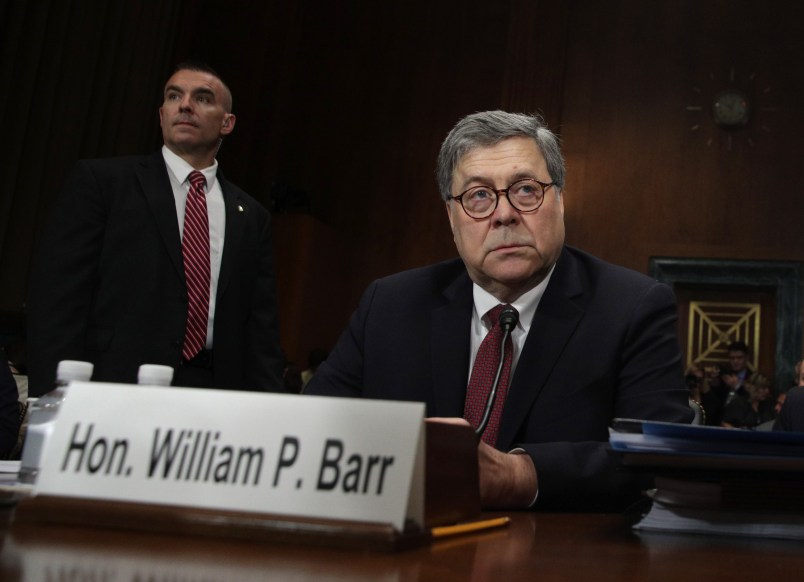Over and over in his testimony on Wednesday, Attorney General Bill Barr chided special counsel Robert Mueller over his handling of the Russia probe.
Barr’s criticisms of Mueller mostly focused on procedural issues, but they tended to come as part of the attorney general’s defense of his own conduct.
Particularly in response to critiques that he decided to clear President Trump of any wrongdoing on obstruction when it wasn’t necessarily his decision to make, Barr lashed out at the special prosecutor, arguing that Mueller overstepped his bounds both in investigating certain allegations of obstruction and in publishing his own analysis of the matter.
Mueller should have halted obstruction probe
At one point Wednesday morning, the attorney general told Sen. Chuck Grassley (R-IA) that Mueller should have stopped the obstruction if he believed he was unable to prosecute the President.
“If he felt he shouldn’t go down the path of making a traditional prosecutive decision, he shouldn’t have investigated,” Barr said. “That was the time to pull up.”
Justice Department policy has long stated that a sitting president cannot be indicted.
The attorney general added, “I really could not recapitulate his analysis,” and also said that he was “not really sure” how Mueller came to his conclusion on the question of obstruction.
At another point in the hearing, the attorney general told Sen. Lindsey Graham (R-SC) that he found it “confusing” that the special counsel’s investigation continued “for a while as additional episodes were looked into, episodes involving the president.”
Barr went on to suggest that Mueller overstepped his bounds by continuing to probe the obstruction allegations while he knew that the Office of Legal Counsel opinion prohibited bringing charges against a sitting president. Barr did not address his statement at a press conference before the report’s release that the OLC opinion did not factor into Mueller’s analysis.
“So my question is, or was, ‘why were those investigated if at the end of the day you weren’t going to reach a decision on them?'” he told Graham.
Special counsel didn’t use ‘proper standard’
Barr peppered the hearing with other jabs at the special counsel, often as a way of deflecting criticism of his own actions.
Some of the starkest examples came during questioning by Sen. Richard Blumenthal (D-CT).
Blumenthal quoted the Mueller report as saying that if the special counsel’s office had exonerated Trump of obstruction, “we would so state.”
The senator then asked Barr why he had decided to issue a decision stating that there was insufficient evidence to charge Trump with obstruction, when Mueller made a different determination in the report.
“The difference is I used the proper standard,” Barr said.
“I found that whole passage very bizarre,” the attorney general added.
Barr went on to imply that the Mueller probe was nothing more than a political broadside against the Trump administration, aligning the attorney general with the view taken up by conservative fever swamp over the past two and a half years.
“We have to stop using the criminal justice process as a political weapon,” Barr said.
‘What’s with the letter?’
The attorney general also lashed out at Mueller regarding questions over a March 27 letter that the special counsel sent complaining that Barr had failed to “fully capture the context, nature, and substance” of the report.
“The letter is a bit snitty, and I think it was written by a member of his staff,” Barr said.
He went on to recount his reaction to a phone call with Mueller that apparently followed the letter.
“‘Bob, what’s with the letter?'” Barr recalled telling Mueller. “‘Why couldn’t you just pick up the phone and call me?'”
‘Skeptical’ of Mueller’s approach
Barr took a direct swipe at Mueller’s reasoning on obstruction in an exchange with Sen. Amy Klobuchar (D-MN).
Barr said that he was “skeptical of this approach,” referring to Mueller’s analysis that Trump may have met the standard for an obstruction of justice charge because the President perceived that the investigation may have uncovered a crime.
The attorney general has his own position on the matter, which boils down to the proposition that the president “does not have to sit there constitutionally and allow” a proceeding he believes to be falsely grounded “to run its course.”
Barr told Klobuchar that he was “skeptical” of Mueller’s approach because if Trump’s actions are authorized by the Constitution,” it’s hard to establish beyond a reasonable doubt” that a crime was committed.
Mueller made redactions take too long
The attorney general also nitpicked that Mueller should have identified grand jury materials (6E material) in the final report submitted to the Justice Department. Barr aired the criticism while defending his March 24 letter summarizing the top lines of the report, blaming Mueller for delaying the release of the redacted report.
“I reiterated to special counsel Mueller that in order to have the shortest possible time before I was in a position to release the report, I asked that they identify 6E material,” Barr said Wednesday morning. “Unfortunately it did not come in that form and it quickly became apparent that it would take about three or four weeks to identify that material and other material that had to be redacted.”






